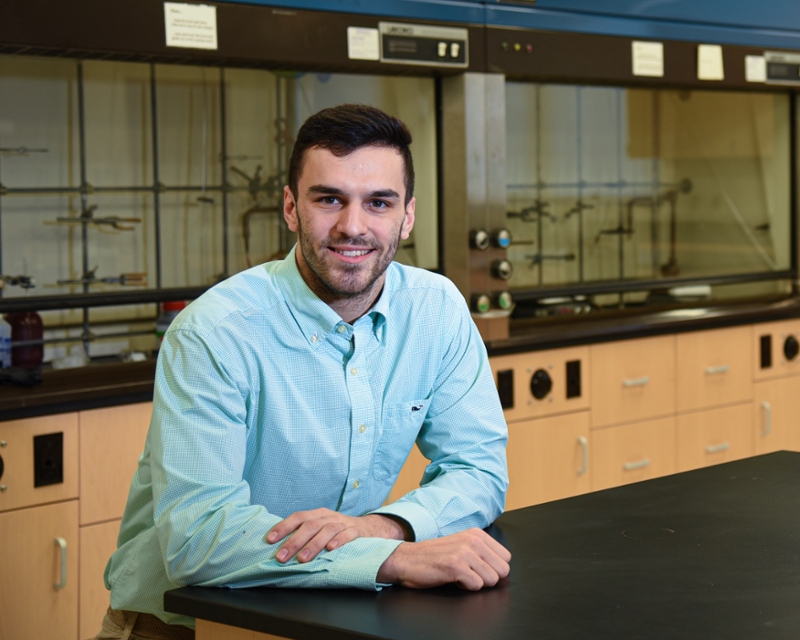
Download Image: Web
It hasn’t taken long for the new biochemistry major at Lycoming College to spark interest among students. Launched in the fall of 2018, the lab-based science that marries biology and chemistry is becoming a popular choice for students who aspire to work in academia, industrial settings, pharmaceuticals, health professions, and more. For Nicholas Russello ’20 of Guilford, Conn., it was a biochemistry course that ignited in him a curiosity in research that hadn’t existed before.
Biochemistry was not yet an established course of study when Russello started at Lycoming in the fall of 2016, so he pursued a degree as a biology and chemistry double major with plans to enter the medical field. With aspirations of becoming a surgeon, Russello had been focused solely on patient care. Instead of pursuing a research path, he opted to become an EMT (emergency medical technician) to get patient contact hours. But when Allison Saunders, assistant professor of biochemistry, joined the faculty in the fall of 2019, Russello took notice.
“I thought biochemistry could be very interesting. I wanted to see how biology and chemistry are connected, and it ended up being one of my favorite courses to date,” said Russello. “I loved the way the material blended, and became not only happy, but excited to do research with Dr. Saunders.”
Russello became the first Lycoming student to complete biochemistry research, spending the fall semester working with Saunders in the newly established biochemistry laboratory and later presenting “Cloning and Expression of a Radical SAM Gene,” in the Chemistry Colloquium. The research is on a gene in the microorganism Clostridium populeti, that expresses a putative radical SAM protein in the gut microbiota of Parkinson’s disease patients.
“This area interests me primarily because it has large scale implications within the medical world. Biochemical research has provided many of the useful drugs that are present today. A further understanding of various proteins and their mechanisms of action can be pivotal toward understanding and treating diseases, thus affecting the lives of thousands or more,” he said.
“Nick is a motivated student, and his taking on a research project while I was setting up a brand new lab was a good fit,” said Saunders. “He’s set a high bar for the biochemistry research students who are sure to follow in his footsteps.”
Looking back at the start of his undergraduate career, Russello settled on Lycoming because he thought that the small liberal arts and sciences environment would provide a unique opportunity to involve himself in many facets of campus life, both socially and academically, and become more well-rounded. As a student athlete, Russello learned to balance his academics with his commitment to the Men’s Lacrosse Team – a commitment that sometimes required upwards of 30 hours per week.
“By necessity, I became an expert at managing my time and living a healthy lifestyle. I can confidently say that being a student athlete has been pivotal in developing my drive. If I'm not filling my time with something that will better me as a person, I have a nagging feeling that I can do more,” he said. “Research has opened my eyes to a realm in which I never thought I'd find interest. I am willing and hopeful that I will be able to find an opportunity to continue to do research in medical school.”
During his last semester as an undergraduate at Lycoming, Russello had some parting words for his fellow Warriors: “I would encourage everyone to seek out opportunities they may think don't suit them. The beauty of Lycoming is that there is so much to discover and you never know what may interest you if you don't put yourself out there and find out.”
Funding for the new major was established by Peter and Joyce Lynn, through the Peter ’69 & Joyce Lynn Endowed Program in Biochemistry. The Lynns’ passion for philanthropy and interest in STEM education has influenced their support of several significant college initiatives, including the addition of the Lynn Science Center— the multi-curricular facility named after the couple for their leadership gift to the building.